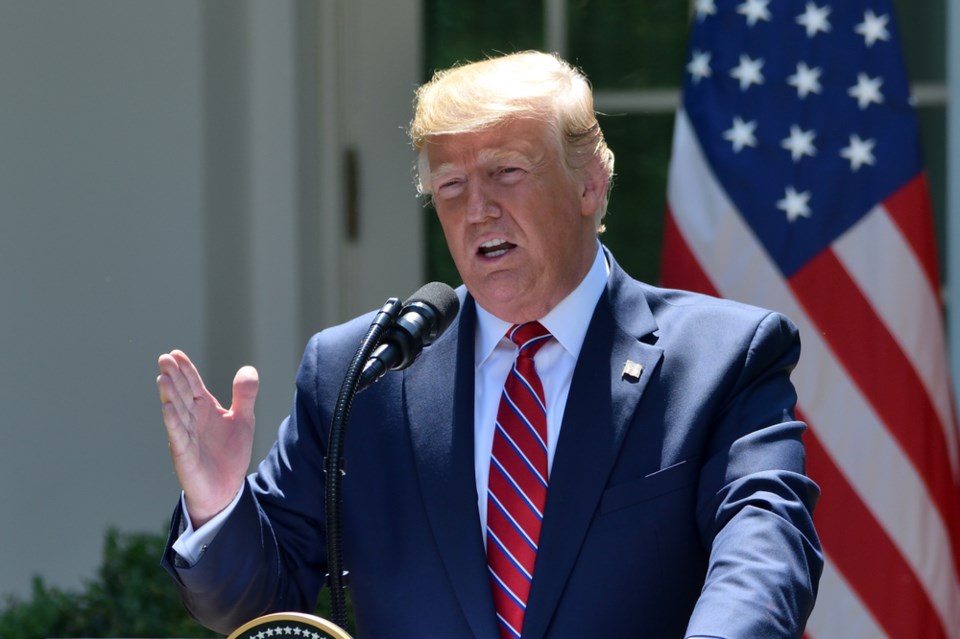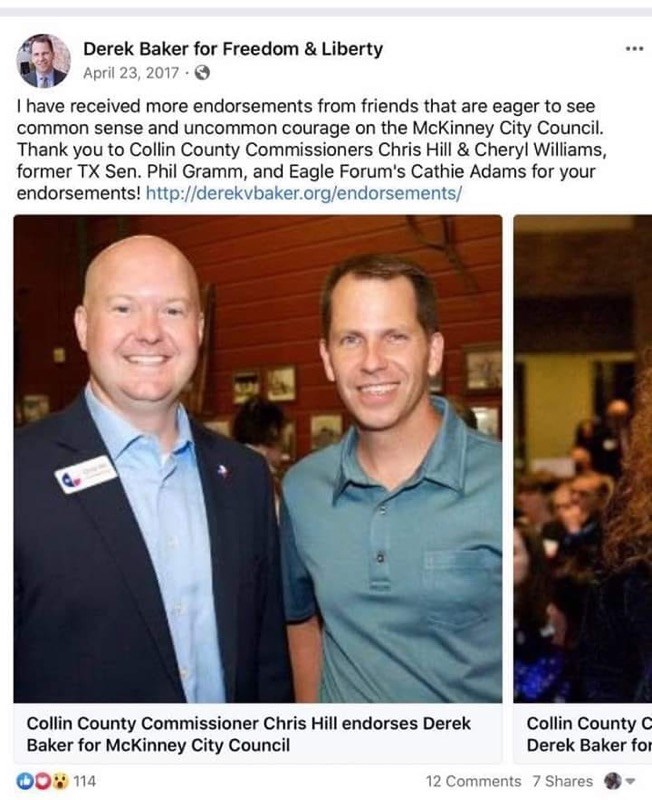McKinney Mayor George Fuller was taking the lead in Collin County’s fight against COVID-19. Then a lead realtor from a Conservative real estate agency appeared wielding a temporary restraining order.
How to “flatten the curve” has been a matter of constant debate among public officials from the President on down to local government.
Last week, President Trump was hoping to open the country back up on Easter and make our triumph over the coronavirus a resurrection affair. But now he’s warning that if people don’t start sheltering in place, we could be facing 1.6 to 2.2 million deaths. He claims the worst of it will be hitting around that sacred rebirth holiday and predicts that we would overcome the virus by early June. He previously predicted that it would be August, maybe longer, before normal life resumes.
On Sunday, he announced that he’s expecting probably 100,000 people to die from COVID-19 complications and would be extending his “social distancing guidelines,” otherwise known as a “shelter-in-place order,” until April 30. Trump’s health officials have claimed the number will be more like 200,000 if we’re able to slow the spread.
“The peak in death rate is likely to hit in two weeks,” Trump said at his Sunday press conference. “Nothing would be worse than declaring victory before the victory is won.”
Trump’s guidelines inspired Gov. Abbott’s and, in turn, Collin County Judge Hill’s voluntary guidelines. Gov. Abbott announced Tuesday that he was extending his shelter-in-place order until the end of April and warned that people could be fined, jailed, or quarantined if they violate it.

Defining Collin County’s Shelter-in-Place
Last week, County Judge Chris Hill issued what he called Collin County’s version of a shelter-in-place order, which allows nonessential businesses to remain open if they follow Gov. Greg Abbott’s and the CDC’s COVID-19 safety guidelines: no more than 10 people gathered together, safe social distancing of six feet apart, and 20-minute hand washing. For those feeling ill, they ask that they remain home and isolated for a couple of weeks until symptoms pass.
However, Mayor Fuller didn’t believe these voluntary guidelines were good enough. He has been on a quest to create more restrictive shelter-in-place orders in McKinney, and he hopes his efforts inspire a domino effect among the 17 other mayors of Collin County.
Dallas was on high alert with 549 confirmed cases and 11 fatalities, as of this writing. In Denton County there are nearly 200 confirmed cases and three deaths. It seemed only logical to assume the same would happen in McKinney and the rest of Collin County. Cases have been doubling across the state until recently, Dr. John Hellerstedt, commissioner of the Texas Department of State Health Services, pointed out last week at Gov. Abbott’s press conference.
At the press conference Tuesday, Lt. Gov. Dan Patrick attributed it to a majority of Texans following Abbott’s guidelines.
Yet, the number of COVID-19 cases is hard to track since testing isn’t readily available in Collin County or elsewhere around the state. No one really knows how fast or how far it’s spreading. Most people who are experiencing mild symptoms are told to isolate at home and assume that they have it, and are only tested if they’re experiencing extremely high fever and struggling to breathe.
In Collin County, 160 people have tested positive and there has been one confirmed death, as of this writing. Seven of those people are in McKinney. Last week, Fuller pointed out that only about 125 people had been tested in the county. He mentioned that his friend and guitar brother was experiencing symptoms that turned serious and only received a COVID-19 test after he was admitted to the hospital. He died due to complications from the virus.
Fuller introduced an order for McKinney that closes all nonessential businesses despite Judge Hill’s reluctance to do so county-wide. Fuller says he’s simply trying to protect people and prevent an explosion of cases like the ones erupting in California and New York.
Fuller was in the process of revising his third shelter-in-place order, which is now a city ordinance, when he announced that his 19-year-old daughter, Layla, was experiencing COVID-19 symptoms. She’s a student at Dallas Art Institute and lives near the campus in Dallas. On Friday, Fuller told Local Profile that he couldn’t get her tested. Then he tracked down a company offering COVID-19 testing. “There is a company that is now able to do in-home testing and they are on their way to test her,” he said.
Fuller confirmed that his daughter had tested positive for the virus on the Monday evening news. “It’s real tough as a father,” he told Fox 4 News. “She lives alone in Dallas off campus at the Dallas Art Institute. We’re only able to comfort her via Facetime.”
Though he hadn’t been in contact with his daughter for several weeks, Fuller is self-isolating with the rest of his family and awaiting COVID-19 test results. His wife and other daughter had been dropping off care packages to Layla, Community Impact reported Monday.
Fuller’s shelter-in-place order was similar to the county judge’s but on steroids. Fuller has said on several occasions that they could only slow COVID-19’s spread by limiting places where people gather. So he closed all businesses that didn’t offer some kind of essential service like health care, retail grocery stores, or government services.
It was considered a bold move since McKinney is not experiencing the worst of the virus, but many health care providers have said it was needed. It also followed in the footsteps of other counties such as Dallas, Denton, and Tarrant. And with only 3,200 ICU beds, limited personal protective equipment available, and a nursing staff shortage, any measure that allows hospitals to better prepare for the mass influx of COVID-19 patients that health care officials in other states are warning us about would seem to be a step in the right direction.
Fuller wasn’t the only Collin County mayor doing so. Frisco, Plano, and Richardson have also passed similar restrictive ordinances closing nonessential businesses.
But not everyone agrees with such extreme measures especially when city officials contradict what a county official has implemented.
The Man Behind the Lawsuit
Enter Derek Baker, the lead real estate agent of Conservative Move. A clean cut Texas conservative with political aspirations, he argues that the McKinney mayor’s shelter-in-place order conflicts with the county judge’s. His real estate business is essential under Hill’s orders but considered nonessential under Fuller’s. Baker pointed out in his March 26 lawsuit that he would be suffering “irreparable harm in the form of lost business, lost professional contacts, loss of prospective business and damage to his professional reputation and good will.”
Here’s a video that explains Baker’s business:
A former candidate for McKinney city council, he was appointed to the Collin County Planning Board by Judge Hill, who supported him in his bid for council.

Baker had been complaining about Fuller’s shelter-in-place order since Fuller announced it last Tuesday. He posted about it on Facebook in an open letter to McKinney residents where he compares his reading of both Fuller’s and Hill’s orders: “Thus, based on a plain reading of both orders, Mayor Fuller’s order of today is in direct conflict with Judge Hill’s order of yesterday. Mayor Fuller was at Judge Hill’s press conference yesterday, so I am very perplexed by this order he issued today.”
He was so perplexed that he filed a lawsuit on Thursday, seeking injunctive and monetary relief of less than $100,000.
At Friday’s special city council meeting, Fuller mentioned Baker by name, “Conseverative McKinney (Baker’s group) claiming that our order is not legal, that the county supersedes it and the statement by the county judge supersede my order. Derek Baker is wrong. He is not an attorney and he doesn’t understand it. That we’re not going to enforce it. You will be making a great mistake in listening to him.”
On Saturday afternoon, he wrote on his Mayor George Fuller Facebook page: “As Mayor of McKinney, I will fight this baseless lawsuit filed by Derek Baker.”
Baker claimed Fuller was vilifying him on Facebook.
Collin County District Judge Jill Willis didn’t seem to think Baker’s lawsuit was baseless. She was listening to him. She granted Baker’s request for a temporary restraining order and planned to sign it Monday, then delayed it until Tuesday afternoon after the mayor’s daughter tested positive for COVID-19.
Baker’s lawsuit could set a precedent that causes the reverse of the domino effect that Fuller was hoping to inspire: it could forcing other cities to amend their ordinances to allow nonessential businesses to open as long as they’re following the president’s, the governor’s, and the CDC’s COVID-19 guidelines.
“I was informed this evening about a lawsuit against the city of McKinney, but have not yet seen a copy,” Hill posted Thursday evening on Facebook. “It is my understanding that the lawsuit alleges a conflict between McKinney’s disaster orders and my own. I have already spoken with Mayor Fuller to invite him to work with me to bring our orders into clear harmony and to demonstrate continued cooperation between the county and the city.”
Hill’s shelter-in-place order also recommends sick people stay home; if a person tests positive for COVID-19, everyone in their household should stay home; if a person feels they are at higher risk for several illness if exposed, they should stay home; and “all persons in Collin County are hereby ordered to stay home except for travel related to essential activities” at what other cities and counties consider to be nonessential businesses.
On Monday morning, Collin County commissioners extended Hill’s order for another seven days. Hill told commissioners that his order was meant to give city leaders leeway into enacting more restrictive orders if they felt it was necessary for their city.
A Question of Power
Baker claims that his lawsuit wasn’t an attack on the mayor. In his lawsuit, he argues that Fuller exceeded his limited powers when he issued the shelter-in-place order and not only contradicted the county judge’s “Order of the County Judge” but also the Texas Constitution. “It must be declared void and of no further force or effect,” Baker’s attorney, Jim Pikl, wrote and then quoted the Texas Government Code:
That during an emergency, “…the jurisdiction and authority of the county judge includes the incorporated and unincorporated areas of the county; and to the extent of a conflict between decisions of the county judge and the mayor, the decision of the county judge prevails.”
Pikl has an interesting background, which Fuller pointed out in a Monday afternoon Facebook post. He sought a judge seat in the last election, and like other people, he’d been exposed to fake news. In a early March tweet, Pikl wrote, “The #COVID-19 hoax was started by Proctor and Gamble to start an emergency purchasing war to clean out their inventories of products. And you fools fell for it. Hilarious.”
Fuller shared screenshots of Pikl’s tweets and wrote, “I believe that is an uninformed position. My hope is that, if all the science and data was not enough, the President’s address yesterday convinces him to rethink his position.”
Hundreds of commenters disagreed with Pikl’s position. One pointed out, “I just don’t even think that’s a decent conspiracy theory. It’s lame.” Another worried about the Pikl’s and Baker’s safety. “With all respect mayor, but this adds fuel to the fire and makes people go after this guy and Derek Baker and cause them harm. Praying for peace and grace. We all need it during this hard time.”
Baker claims he’s been receiving death threats since he filed the lawsuit against Fuller last week.
Pikl may have been joking. Local Profile was unable to reach him by deadline.
Fuller was planning to fight the judge’s decision. He planned to appeal it and find a way around Hill’s order by issuing a fourth revised shelter-in-place declaration. “If the judge issues a temporary restraining order, I will issue another declaration within 10 minutes after that,” Fuller told Fox 4 News earlier this week. “It would be the same darn declaration with a word changed. What we’ve put in place is important. It’s essential.”
In a surprise move, Judge Willis changed course and denied Baker’s temporary restraining order. She claimed that since the mayor had changed his declaration to a city ordinance, he was no longer violating the statute that Baker pointed out in his lawsuit.
Fuller took to Facebook to share the news with his followers: “I am pleased to announce that District Judge Jill Willis just denied the [TRO] requested in the case filed against me as Mayor of McKinney. This TRO would have lifted our ability to enforce the protective ordinance orders we adopted last Friday as a council. As the safety, health and wellbeing of this community is our highest priority. I appreciate this critical ruling. However, residents should understand that this ruling only denied the TRO requested, the lawsuit itself can still be pursued unless the plaintiff (Baker) withdraws the suit.”
Baker doesn’t plan to pursue the lawsuit, according to a March 31 Dallas Morning News report.
“Also, I want to thank Gov. Abbott for his leadership,” Fuller continued in his March 31 Facebook post. “I am grateful that he understands the varying conditions that exist across Texas and for clearly stating again, just a few minutes ago, that cities have the authority to implement more strict orders as they deem necessary.”
The next special city council meeting is scheduled for April 3. Fuller will no doubt extend his shelter-in-place order and keep nonessential businesses closed.




